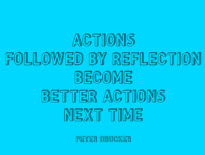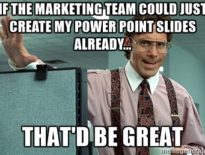
Provocative thought, I hope. “Can’t”?? I’m sure you’ve felt frequently that Marketing has failed. You’ve had that consultant, agency, or tried what that marketing article advised, and it just didn’t work out.
But I chose that word carefully. Not, “Doesn’t,” not, “won’t,” and not, “might,” because marketing actually can’t. Marketing is a practice; things you do can fail: the product, the promotion, the placement – and here’s the ringer: that might be Marketing’s fault, but without marketing you will fail.
Among the most frequent Startup mistakes?
“I have a great product. It’s what you want.”
“My business is fixing that, we’re seeking funding to do it.”
“My company solves that problem.”
“Our solution is unique and we have no competitors.”
—
Running incubators as I do, hearing that makes me cringe. We hear it a lot.
As entrepreneurs, we must make decisions with data. Thing is, given our passion and mission in what we’re doing, we tend to make decisions based on experience, world view, or emotion.
Products and people fail. The practice (the work of) learning from the market so that you have the data to make the right decisions, isn’t a succeed/fail scenario – it’s just data that informs.
Not convinced? While you’re determined to focus on the product and solution, history shows us time and time and time again that the lack of marketing leads to massive product, business decision, and investment failures.
Ford’s Edsel
Large, unusual, and heavily promoted, Ford put $400 million into an innovation at a time when American’s were shifting away from the massive gas guzzlers of the fifties and starting to adopt Europe’s more economical cars.
Sony Betamax
Proprietary video requiring the player and specific tapes. We know in hindsight how well that works; our media industry wrestled with torrenting streaming as we’ve wrested away proprietary control. Still, Sony went with Betamax and years later the industry tried again with the Blu-Ray / HD DVD battle.
New Coke
A sweeter and newer Coca-cola. Pepsi was responsible for this; it was a snap reaction to a competitor getting attention in commercials: The “Pepsi Challenge.” Pepsi Marketing knew what it was doing – in blind taste tests, samples, people indeed prefer the taste of Pepsi. But in greater consumption, no one wanted the sweeter, Pepsi-like taste of New Coke.
Microsoft Zune
Remember Betamax? When most digital music was the on iTunes, do you think anyone was seeking an iPod alternative? Microsoft’s failure to realize that the market was in the content, the music, not the device.
Barnes and Noble’s Nook
A competitive analysis fail. People experience Barnes and Noble for the shopping experience of buying a book. Amazon’s investment in and focus on technology ensured that Kindle was cheaper and synced to a massive library of content. Not dissimilar for Zune’s failure… the market was for the content, not the device; the less expensive device wins.
Amazon’s Fire Phone
From Amazon win to Amazon fail, one might think that focus on technology alone is what matters. Amazon’s Fire Phone shows otherwise. With the iPhone the premium product and Samsung putting the cost of such devices through the floor, no one needed nor wanted another device just for the sake of having Amazon on demand.
Google+
Friendster was replaced by MySpace and MySpace was replaced by Facebook… we’re better at technology and have far more data and money at our disposal, we should be next!
“Google+ was one of the most ambitious bets in the company’s history,” Eric Schmidt wrote in his book, How Google Works.
Yeah…
People don’t buy products or services — they buy results, benefits and solutions.
Hector Quintanilla; DigitalAgeEducation.com
PUSHING products and solutions opens the door to failure.
Designing products and solutions based on what the market wants results in products and solutions that don’t fail. And that work, along the way, isn’t what’s failing, it’s the work of research, data, and study, to learn and direct the job to be done.
Marketing is a Practice. We don’t fire Doctors because you’re too unhealthy to actually cure. We don’t fire Lawyers who can’t keep you out of jail when you’re in fact guilty. The PRACTICE undertaken in this work is the study of doing things better; the study of knowing how you get or remain healthy or the study of how your business CAN and SHOULD work.
Startups most frequently fail because they waste scarce resources (cash and time) on advertising and promotions. Startups fail because they aren’t investing in Marketing to make the right decisions, they’re turning to Marketing to sell what they’re doing.
Promotion is one of the Ps of marketing and when you’re actually doing Marketing, and not just Promotion, it includes all the other Ps in the foundation of the role: Pricing, Placement, Product, People, etc.
Product. Marketing determines the product.
Founders that start anything without having first and foremost been marketing (studying the market, knowing competitors, uncovering from where funding might come), are shooting an arrow at a target while blind and drunk.







Well said
Amen.
ABS- Always Be Split-Testing
Some of the best advice. And advice I myself even fail to put in practice enough.
We have a book called “Always Be Testing” and yet it’s often bad advice for startups. There’s a huge cost for testing. Too often companies test variations without regard for weighing the value of the variables.
Jeffrey Eisenberg great point. Both your point and Michael Johnson’s rather reinforce mine, I think; that people KNOW how to do this stuff and founders should (must) expect it of “Marketing” rather than just thinking marketing is lead gen.
And yes, that work in particular can be bad advice for startups as startups often aren’t at the point of even knowing what to test, having enough with which to test, nor being able to capably invest in doing so.
As for myself and my team; I just mean it’s a good reminder that “we” know how and have the technology folks to do it… shame on us for not eating our own dogfood LOL
Once you figure the small handfull of variables that really matter to your customers then test boldly. If it tanks pull it. Any variable that can’t tank your business can’t grow it either. Bold tests can give you greater confidence without large audiences.
Jeffrey Eisenberg Do you have any kind of guidance you can offer up to smaller merchants, and I do mean those under a million dollars a year that would help them decide what and when they should be testing?
Yes but I worry about offering it out of context. Businesses under $1M often have obvious issues they haven’t worked out yet. Those should be prioritized. The problem with testing is that it mostly rewards binary thinking. Innovation is hard to split test. I like to use the example of an in-store retail checkout. So many retailers have experimented with self-checkout, mobile devices for employees and express lines. Amazon tested (not a split test) Amazon Go. They identified the variable that mattered (waiting in line) and eliminated it. Business is not like a laboratory. Split testing offers the illusion of certainty. Businesses count success revenue and profit.
Hmm – FirePhone. What killed that was not having access to the Play store. Otherwise price and features were great.
Zune – Applying the XBox model to music just didn’t work. It also didn’t work for music/other content on the XBox.
Nook – it’s the content. Without that it doesn’t matter if you’re slightly cheaper or more expensive. I would submit that Kindle Unlimited did more to seal the e-reader market than anything. Before that there were alternatives, after that, pretty much nothing.
New Coke – “Laugh all you want, we got the shelf space B*t*hes.”
I’m fascinated by this. I take it you mean that while marketers can (and often do) fail, “marketing” itself cannot, hence “marketing failures” are really a matter of malpractice, per your comparison to the practices of law and medicine. I would contend however that there are plenty of ways/areas where law and medicine have indeed failed (and continue to), as they’re imperfect, incomplete, and ever-evolving — just as marketing is. (But yes, most of those tech products failed because they were just bad, not due to their marketing.)
Failing to invest in and prioritize Marketing is akin to failing to invest in knowing the law. Ignorance of the law isn’t a defense.
Or better, the medical practice. Failing to invest and prioritize your own health will find you ill or worse. Doctors can’t prevent that; that’s not their fault. They are doing the work of telling us how to be healthy and address illness; what we do with it is on us.
Again, I think history demonstrably proves that the law has failed time and time again (esp. women, people of color, the poor, etc.) and continues to due to the imperfections of its makers. Medicine fails as well. Neither are set-in-stone perfect ideals (far from it), but continually sculpted over time, and inexorably linked to their sculptors, rather than independent of them.
In other words, law/medicine/marketing practices are not stone tablets handed down from God — they’re a work-in-progress mess.
Also, since when is it marketing’s job to ensure a product isn’t bad? That’s preposterous. (Or am I somehow misreading that last part?)
Paul Alvarado product management is a marketing function except in tech companies
I don’t think we can get into a Marketing MBA in a Facebook group but the very basis of Marketing is what’s referred to as the 4Ps: Promotion, Product, Place, Price.
The word Product on the wikipedia listing for Marketing is eclipsed only in word count by the word Marketing.
“Marketing research, conducted for the purpose of new product development or product improvement, is often concerned with identifying the consumer’s unmet needs.”
So sure, maybe saying it’s purpose is to ensure a product isn’t bad is extreme (economists point out is that’s purpose is to eliminate the need to do Sales and Promotions) but I didn’t say that, I gave examples of failed Products that were rather evident to fail given the market. Eliminating the need to do Sales and Promotion means having a Product (or Service) people seek out because the needs and desires of the market, for a Product, at the right Price, and available in the right Place, are known.
Which is to say, I would absolutely say that a bad product is a result of poor marketing.
“Products and people fail. The practice (the work of) learning from the market so that you have the data to make the right decisions, isn’t a succeed/fail scenario – it’s just data that informs.”
Can’t wait for AI to figure this out
I love this so much! I often feel that if I hadn’t gone bald due to my Scottish genes, I’d have just pulled it all out doing start-up marketing work. Still love it, but my forehead is super strong now from banging it against the wall constantly.
I’d go so far as to say it WON’T – and I can prove it
Yep. This has sparked some good discussion elsewhere. It’s astounding (and troubling) how many people *don’t* get it (and I’m not sure why they’d want to make excuses of Marketing)
Paul O’Brien sounds like the need what I’ve been working on!